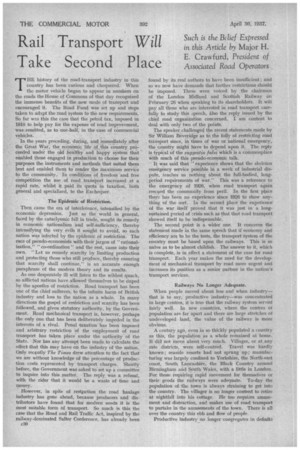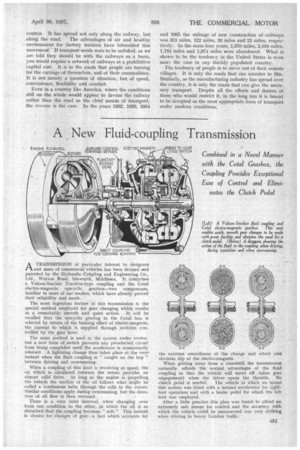Rail Transport Will Take Second Place
Page 84

Page 85

If you've noticed an error in this article please click here to report it so we can fix it.
Such is the Belief Expressed in this Article by Major H. E. Crawfurd, President of Associated Road Operators THE history of the road-transport industry in this country has been curious and chequered. When the motor vehicle began to appear in numbers on the roads the House of Commons of that day recognized the immense benefits of the new mode of transport and encouraged it. The Road Fund was set up and steps taken to adapt the road system to the new requirements. So far was this the case that the petrol tax, imposed in 1010 to help pay for the expense of road improvement, was remitted, as to one-half, in the case of commercial
vehicles. .
In the years preceding, during, and immediately after the Great War, the economic life of this country proceeded under the old healthy. and happy system that enabled those engaged in production to choose for their purposes the instruments and methods that suited them best and enabled them to render the maximum service to the community. In conditions of freedom and free competition the use of road transport increased at a rapid rate, whilst it paid its quota in taxation, both general and specialized, to the Exchequer.
The Epidemic of Restriction.
Then came the era of interference, intensified by the economic depression. Just as the world in general, faced by the cataclysmic fall in trade, sought its remedy in economic nationalism and self-sufficiency, thereby intensifying the very evils it sought to avoid, so each nation was infected by the epidemic of restriction. The race of pseudo-economists with their jargon of "rationalization," "co-ordination" and the rest, came into their own. "Let us remedy scarcity by limiting production and protecting those who still produce, thereby ensuring that scarcity shall continue," is an accurate enough paraphrase of the modern theory and its results.
As one desperately ill will listen to the wildest quack, so afflicted nations have allowed.themselves to be duped by the apostles of restriction. Road transport has been one of the chief sufferers, to the infinite harm of British industry and loss to the nation as a whole. In many directions the gospel of restriction and scarcity has been followed, and given statutory authority, by the Government. Road mechanical transport is, however, perhaps the only one that has been deliberately impeded in the interests of a rival. Penal taxation has been imposed and arbitrary restriction of the employment of road transport has taken place under the authority of the State. Nor has any attempt been made to calculate the effect that this may have on the industry of the nation. Only recently The Times drew attention to the fact that we are without knowledge of the percentage of production costs represented by transport charges. Shortly before, the Government was asked to set up a committee to inquire into this matter. The reply was a refusal, with the rider that it would be a waste of time and money.
However, in spite of restriction the road haulage industry has gone ahead, because producers and distributors have found that for modern needs it is the most suitable form of transport. So much is this the case that the Road and Rail Traffic Act, inspired by the railway-dominated Salter Conference, has already been c30 found by its real authors to have been insufficient ; and so we now have demands that further restrictions should be imposed. These were voiced by the chairman of the London Midland and Scottish Railway on February 26 when speaking to its shareholders, it will pay all those who are interested in road transport carefully to study this veech, also the reply issued by the chief road organization concerned. I am content to deal with only two of the points.
The speaker challenged the recent statements made by Sir William Beveridge as to the folly of restricting road transport since, in times of war or iiational emergency, the country might have to depend upon it. The reply is typical of the suggestio falsi which-is a commonplace with much of this pseudo-economic talk.
It was said that " experience shows that the skeleton emergency service possible in a week of industrial dispute, teaches us nothing about the full-bodied, longperiod requirements of war." This was a reference to the emergency of 1926, when road transport again rescued the community from peril. In the first place there has been no experience since 1926 to show anything of the sort. In the second place the experience of the war itself proved that it was just in a longsustained period of crisis such as that that road transport showed itself to be indispensable.
The second point is a wider one. It concerns the statement made in the same speech that if economy and efficiency are to be the tests, the transport system of the country must be based upon the railways. This is so naive as to be almost childish. The answer to it, which is complete, is in effect a statement of the case for road transport. Each year makes the need for the development of mechanical transport by road more urgent and increases its position as a senior partner in the nation's transport services.
Railways No Longer Adequate.
When people moved about less and when industry— that is to say, productive industry—was concentrated in large centres, it is true that the railway system served fairly well. In new countries, where the centres of population are far apart and there are large stretches of undeveloped land, the value of the railway is more obvious.
A century ago, even in so thickly populated a country as this, the population as a whole remained at home. It did not move about very much. Villages, or at any rate districts, were self-centred. Travel was hardly known; seaside resorts had not sprung up; manufacturing was largely confined to Yorkshire, the North-east coast, South Lancashire, the Black Country around Birmingham and South Wales, with a little in London. For those requiring rapid movement for themselves or their gcods the railways were adequate. To-day the population of the town is always straining to get into the country. The villager is no longer content to retire at nightfall into his cottage. He too requires amusement and distraction, and makes use of road transport to partake in the amusements of the town. There is all over the country this ebb and flow of people.
Productive industry no longer congregates in defirlit...
centres. It has spread not only along the railway, but along the road. The advantages of air and healthy environment for factory workers have intensified this movement. If transport needs were to be satisfied, as we are told they should be with the railways as a basis, you would require a network of railways at a prohibitive capital cost. It is to the roads that people are turning for the carriage of themselves, and of their commodities. It is not merely a question of situation, but of speed. convenience, flexibility and comfort.
Even in a country like America, where the conditions still on the whole would appear to favour the railway rather than the road as the chief means of transport, the reverse is the case. In the years 1932, 1933, 1934 and 1935 the mileage of new construction of railways was 321 miles, 122 miles, 33 miles and 25 miles, respectively. In the same four years, 1,370 miles, 2,019 miles, 1,784 miles and 1,974 miles were abandoned. What is shown to be the tendency in the United States is even mori the case in any thickly populated country.
The tendency of people is to move out of their remote villages. It is only the roads that can minister to this. Similarly, as the manufacturing industry has spread over the country, it is only the roads that can give the necessary transport. Despite all the efforts and desires of those who would restrict it, in the long run it is bound to be accepted as the most appropriate form of transport under modern conditions.








































































































































































